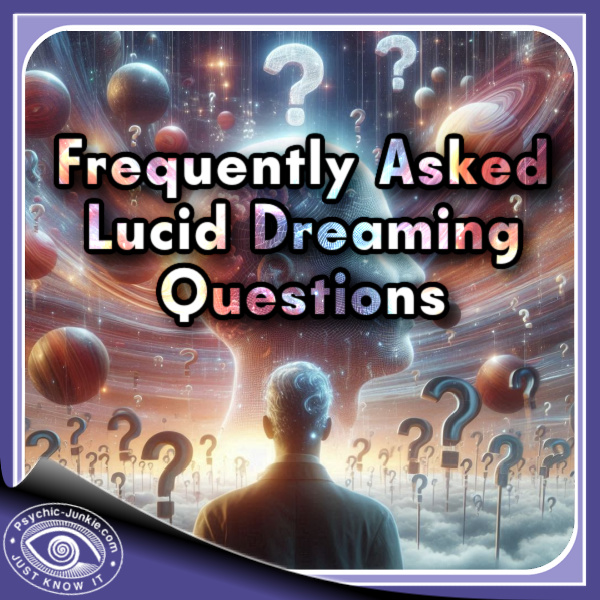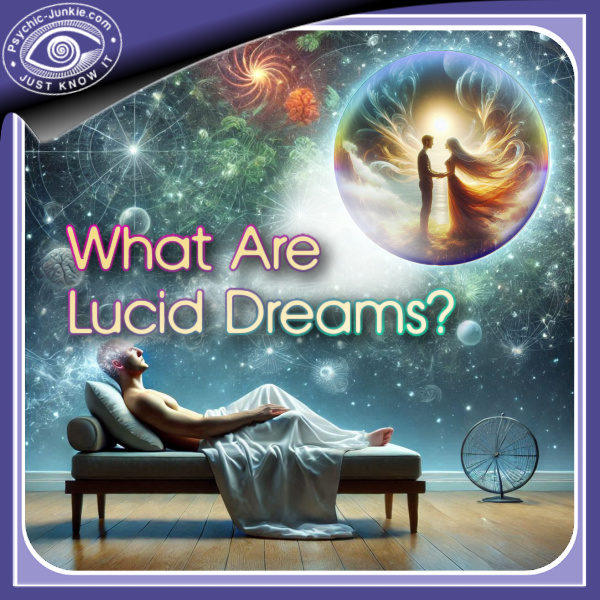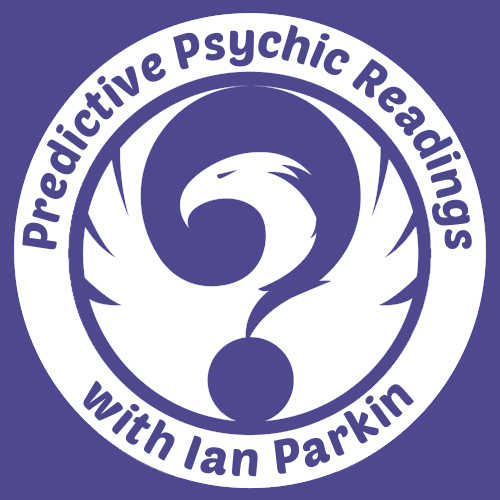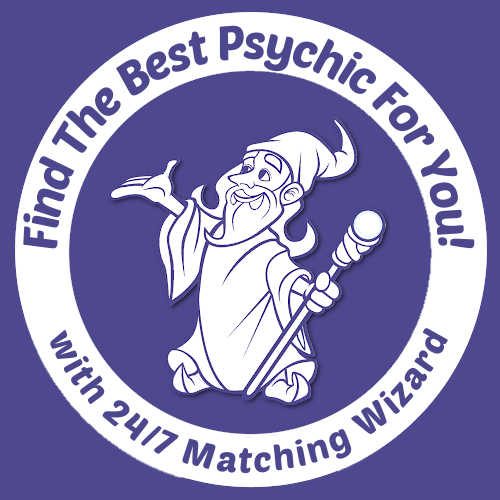- Home
- Dream Readings
- Lucid Dreaming Questions
Ian Parkin is the author of this post.
Lucid Dreaming Questions With The Answers You’re Looking For
People ask me their lucid dreaming questions for various reasons, depending on their interests, goals, or curiosity. Some are keen on improving their ability to control their dreams, often focusing on techniques like reality checks, dream journaling, or meditation to achieve or enhance lucid dreaming.
Others ask me their lucid dreaming questions because they are drawn to the idea of exploring their subconscious mind, using lucid dreams as a tool for self-discovery or unlocking creative ideas. For many, this growing list of lucid dreaming questions and answers offers a form of entertainment and escapism, providing a safe space to experience fantastical adventures such as flying or exploring imaginary worlds.
At a recent social event I was stopped by a friend who was suffering from recurring nightmares, and I was able to help him explore lucid dreaming as a way to confront and transform his fears into some really positive experiences.
At a Psychic Fair I met with others more attracted to the spiritual or mystical aspects of lucid dreaming. Their lucid dreaming questions were more connected to seeing this all as a gateway to their deeper understanding of consciousness, meditation, and even astral projection.
I believe there are also therapeutic applications to lucid dreaming when the techniques can be utilized as an aid in emotional processing, problem-solving, and addressing trauma.
Even if you do not relate to any of the above, perhaps you are simply curious about the potential of the human mind, fascinated by this unique state of consciousness and what it reveals about the nature of reality.
Probably the most lucid dreaming questions come from beginners, who more often focus on practical questions, seeking advice on how to start, what to expect, and how to overcome common obstacles.
So, whether for fun, self-improvement, or intellectual inquiry, this ever-growing list lucid dreaming questions and practical answers should captivate you with its mix of science, art, and mystery.
Who Else Has A Lot Of Lucid Dreaming Questions To Ask?
If you would like to ask questions, add answers, or comment on this page please use my contact form. Start the conversation with the heading About Lucid Dreaming Questions.
Or if you're inspired to write an article on this subject please submit a guest post here.
List Of Frequently Asked Lucid Dreaming Questions
Quicklinks to all FAQs
- What is lucid dreaming?
- Is lucid dreaming scientifically proven?
- Is lucid dreaming a skill?
- What can lucid dreaming be used for?
- Can you control your lucid dreams?
- Are lucid dreams psychic?
- How long does it take to learn lucid dreaming?
- Can you naturally have a lucid dream?
- How do I know if I had a lucid dream?
- What are the signs of lucid dreaming?
- Is it dangerous to lucid dream?
- Is lucid dreaming like astral projection?
- Is lucid dreaming like self-hypnosis?
- What is lucid dream recall?
What is lucid dreaming?
- Lucid dreaming is basically dreaming with the awareness that you are dreaming. If you are in a lucid dream, you will usually have some power over your dream - anything from being able to fly or making an object or room appear behind a door or inside a pocket, right up to being able to change into animals and create a whole world! It is like being a director of your own movie.
Is lucid dreaming scientifically proven?
- Yes, lucid dreams have been scientifically proven to exist. Stephen LaBerge PhD, one of the scientific researchers at Stanford university and one of the fathers of the field, used a special machine to track eye movements during a dream (these are associated to your rapid eye movement while you’re dreaming). He asked dreamers to point their eyes left and right in quick succession and this activity was recorded on the machine. He found that in rem sleep people have no control over moving their eyes, but it does suggest the participant is dreaming. More information on this and other experiments of Stephen Laberge are in his book Exploring the World of Lucid Dreaming.
Is lucid dreaming a skill?
- Yes, this is a skill that can be developed. A major part of “training” for lucid dreams is improving your dream recall, that is, how many dreams you can remember.
What can lucid dreaming be used for?
If you are particularly interested in dreams - either in psychology, spirituality or in psychic studies - trying lucid dreaming could help you in your research.
Here is a list of things lucid dreaming can be used for:
- If you're writing fiction or even creating a world for a computer game, you may find being a lucid dreamer very helpful. Lucid dreamers can visualize their project idea as if they were actually in the story or game. You could ask your characters how they feel about something or what they think will happen.
- Some participants compose music in their lucid dreams.
- Lucid dreams can be a realistic enough environment to rehearse a speech or musical performance.
- You can relive previous dreams or experiences.
- They can help in dream interpretation and communicating with your subconscious.
- Transforming into animals or getting superpowers is a unique experience that is hard to get any other way.
Can you control your lucid dreams?
- If you become lucid in a dream where you have a body, you will almost always be able to control your body. However, you might not manage to do anything else. Do not worry, though, most people have no problem with jumping extremely high or flying in a lucid dream! - On the other hand, parts of your brain are less active while dreaming, which can lead to dream/trance logic and sometimes choices you will later regret. For example, you might choose to continue your lucid dream, although you know that once you wake you will only remember half of it. Once you wake up, you may wish that you had stopped your dream.
Are lucid dreams psychic?
- There are differing views on this. Some people claim to have organized shared dreams or precognitive dreams through lucid dreaming. Others say these are simply created in the brain like any other dream, something like self-hypnosis. As a professional psychic myself I can confirm that over the years many prophecies have come from my own lucid dreams.
How long does it take to learn lucid dreaming?
- This completely depends on the person and circumstantial conditions. Some people have a lucid dream just a few nights after finding out about it (usually by accident), while some people can take months! If you do not get enough sleep or feel too stressed after work to try techniques, then it may take a long time, especially if you expect it to. It will also depend on how much effort you put in. However, everybody can dream lucidly, so try practicing with my how to lucid dream guide.
Can you naturally have a lucid dream?
- It is quite rare to have regular lucid dreams naturally, although most people have had a lucid dream at some point in their lives. You can increase the frequency of lucid dreams with some study and practice.
How do I know if I had a lucid dream?
- In general, a lucid dream is defined as a dream in which you know you are dreaming at some point, regardless of anything else. Even if you were lucid one second but lost your lucidity, it is still technically a lucid dream. However, this can be a little misleading. Sometimes you dream that you fall asleep and have a lucid dream! This is often thought of as a sign that you will have a proper lucid dream soon.
What are the signs of lucid dreaming?
|
Signs you were lucid:
|
Signs you were not lucid:
|
Is it dangerous to lucid dream?
While there is no current evidence of lucid dreaming being abnormal or unhealthy in any way, there are a few things you should be aware of that could occur because of practicing lucid dreaming techniques. These possible side effects have been outlined for you below. Please do not let this scare you away from this wonderful tool; rather, remember that with dreams you are dealing with your own subconscious mind, and recklessness is not recommended.
Alienation: Many people have never even asked about lucid dreaming, much less ever experienced it. Some people are also less than open-minded and receptive to new ideas. Do not be surprised if someone considers this whole phenomenon “weird” or “crazy” (which it is not). Do not preach, either; it is not your job to absolutely convince everyone. Often people who spontaneously lucid dream, especially children, may find it surprising that not everyone does. They may even start thinking that they are the only person in the world who has lucid dreams. If they are worried, the best support is to let them know that they are not alone, and they are not abnormal.
Addiction: Lucid dreaming can be used for different purposes. Some may want to try it just for fun, using it as a "safe drug", or a personal virtual reality machine. Having fun is a fully valid reason to experience what is lucid dreaming. However, be careful not to be addicted to this way of escaping your waking life. If you find that you are spending more time sleeping than needed, or that you are thinking more about lucid dreams than your real waking life, take a break.
Dissociation: Lucid dreaming may weaken the borders between waking consciousness, dreaming, and the subconscious mind, reality, and fantasy. This might lead to problems of a dis-associative nature. Probably the most common form of dissociation involves having problems distinguishing lucid nightmares and your waking memories. Everyone who recalls at least one dream will have to sort out what was reality in the morning. This can really be a problem for those who have previously had zero recall and, due to lucid dreaming, have had increased dream recall. Now, suddenly, they have all these excess, illogical memories to sort out. This is unlikely to be a major problem but may be a big annoyance.
However, there are signs that you should watch for that indicate a bigger problem may be developing. Lucid dreaming should not cause these disorders to appear in a waking state:
- Ability to ignore extreme pain or what would normally cause extreme pain.
- Absorption in a television program or movie.
- Remembering the past so vividly one seems to be reliving it.
- Finding evidence of having done things one cannot remember doing.
- Not remembering important events in one’s life.
- Being in a familiar place but finding it unfamiliar.
- Seeing oneself as if looking at another person.
- Other people and objects do not seem real.
- Looking at the world through a fog.
- Not recognizing friends or family members.
- Finding unfamiliar things among one’s belongings.
- Finding oneself in a place but unaware of how one got there.
- Finding oneself dressed in clothes one does not remember putting on.
If this has happened, and there is no other cause (e.g. drugs), take a break from lucid dreaming for a while. In fact, take a break from lucid dreaming at least until symptoms stop.
Creating bad habits or becoming a control freak. When lucid dreaming, you have the option to control the dream world in ways that are impossible in the waking world. You can, for example, make objects appear or disappear, or make people act according to your will. Some people believe this may lead your subconscious to desire this kind of control in the waking world, where it is highly inappropriate. Also, you might be tempted to apply lucid dreaming solutions to waking-life problems instead of facing them; for example, just willing bad things to go away or escaping or destroying them by superpowers. Again, this is probably more of a problem if you are not mentally stable at the outset of the lucid dreaming process.
Accidentally encountering “spiritual” entities. This depends on your worldview. If you are a psychic-junkie like me, you will be looking forward to meeting entities in the psychic realm. However, if you see dreams as a creation of your brain and nothing more, you do not need to worry about spirits or anything similar. If you want to be on the safe side, treating everything in your lucid dream decently and politely will not do you any harm.
What is lucid dreaming like?
Is lucid dreaming like astral projection?
- If you often enter a “dream world” after leaving your body, that is basically the same as the technique called Wake-Initiation of Lucid Dreams. Keep in mind that many people believe that an “astral projection” or a “near death experience” is actually lucid dreaming. Whether these PSI Phenomena are real or just the creative content of your dreams, learning to lucidly dream will expand the variety of your experiences.
Is lucid dreaming like self-hypnosis?
- If, during self-hypnosis, you often enter a “dream world”, that is basically the same as a lucid dream, it’s the method called Wake-Initiation of Lucid Dreams. Click here to get the lucid dreaming hypnosis script.
What is lucid dream recall?
- It is important to know specifically how to recall your dreams because there is no point in having lucid dreams without remembering them. It is worth getting your dream recall up to a few dreams per night for exactly that reason. Becoming familiar with your dreams will also increase your chances of becoming lucid in one. We have REM dreams approximately every 90 minutes of sleep, and while they start off at about 10 minutes, they increase in length to over 45 minutes. If you wake up while you are dreaming, you have roughly an 80% chance of remembering your dreams. Therefore, try setting an alarm clock to 4½, 6, or 7½ hours after you think you will fall asleep. This should wake you up directly from a dream.
The Academy is an online course and training community that will help you take your lucid dreaming skills to the next level - whether you're a beginner or an experienced dreamer. Click here to learn more.
Wiki - Lucid Dreams
Learn To Be A Psychic Medium
An Evidence-Based Path to Communicate With Loved Ones & Others in the Spirit World.
In this FREE hour with Suzanne Giesemann, you will: Gain an understanding of “evidential” mediumship and why it’s so sacred. Discover the 3 keys to mediumship: Belief in the Spirit World, alignment, and a shift in focus from the physical to the Spirit World. Learn how you can begin communicating with your loved ones who have passed. Find mediumship can be a path for your soul’s evolution. Hear about what makes a reading “evidence-based” - and how this form of mediumship raises the bar and meets the true goal of being an authentic and indisputable voice for Spirit. Experience a practice to connect with your guides and ask them for signs. Click here to learn more about this free event > >
Test Your Psychic Ability
The Lifeleap Institute’s Psychic Project is a unique online psychic development tool using real people and events as "psychic targets."
They start by asking you to focus on the "psychic targets" and answer a series of special questions about these targets.
They then reveal to you the actual psychic targets. You get to compare your results with the actual psychic targets. You also get to see the results of other participants.
Even if you think you have no psychic ability, this tool will offer proof that you do.
It's easy to participate and the Psychic Project is free!
Click Here To Test Your Psychic Ability
Develop Your Intuition And Become An Online Tarot Card Reader
You can learn how to become a professional online tarot card reader in 90 days or less with Tatiana Jones' bestselling course.
In this short course, Titania teaches everything you need to know to start an online tarot reading business - with zero experience required!
You do not need to be psychic to read tarot cards online! It is all about being intuitive and “connecting the dots”.
Tarot Reading Entrepreneurship
- Help People Find Meaning
- Work Remotely
- Set Your Own Hours
- Replace Your Full Time Income
- Work Just A Few Hours Per Day
- Home
- Dream Readings
- Lucid Dreaming Questions











